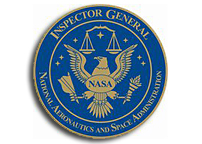OIG's Annual Statement That NASA Has Project Management Issues

2015 Report on NASA’s Top Management and Performance Challenges, NASA OIG
“In the OIG’s view, the principal challenge facing Agency leaders will be to effectively manage the Agency’s varied programs in an uncertain budget environment. NASA’s ability to sustain its ambitious exploration, science, and aeronautics programs continues to be driven in large measure by whether the Agency is able to adequately fund such high-profile initiatives as its commercial cargo and crew programs, Space Launch System rocket and Orion capsule, James Webb Space Telescope, and the personnel and infrastructure associated with these and other projects.”
NASA OIG: NASA’s 2014 Top Management and Performance Challenges, previous post
“The underlying theme of this year’s report is sustainability. Specifically, the OIG noted that NASA’s ability to sustain its ambitious exploration, science, and aeronautics programs will be driven in large measure by whether the Agency is able to adequately fund such high-profile initiatives as its commercial cargo and crew programs, Space Launch System rocket and Orion capsule, James Webb Space Telescope, Mars 2020 Rover, and associated personnel and infrastructure.”
NASA OIG: 2013 Report on NASA’s Top Management and Performance Challenges, previous post
“Similar to last year, we noted that declining budgets and fiscal uncertainties have compounded the difficulty of meeting these and other NASA challenges. Finally, during FY 2014 the OIG will conduct audit and investigative work that focuses on NASA’s continuing efforts to meet these challenges.”
NASA OIG: Final Report – IG-12-021 – NASA’s Challenges to Meeting Cost, Schedule, and Performance Goals, (2012) previous post
“Throughout its 50 year history, NASA has been at the forefront of science and space exploration and the Agency’s missions have resulted in numerous scientific discoveries and technological innovations. Unfortunately, in addition to their scientific accomplishments many NASA projects share another less positive trait – they often cost significantly more to complete and take longer to launch than originally promised.”









It’s amazing the OIG keeps using the phrase “uncertain budget”. You would think the OIG wouldn’t be afraid to say there’s 100% certainty that the working rosy future budget assumptions of these programs aren’t going to happen, and they always, 100% of the time, fail to plan ahead for that.
For an OIG report that highlights the “optimism” of planners as a problem, you’d think by now we’d have moved beyond this game. Instead we find ourselves in the quandary of program / project management raised to say that assuming money falls from the sky, I might, maybe, with great difficulty, be able to do this really, really, hard thing. Maybe. And don’t hold me to that. After all, once I have some money, I’ll just want more, and I’ll be in a stronger position to get it.
Where are the managers ready to admit it’s only going to get worse, and here’s what we need to do to prepare, to get ahead, and to come out even better on the other side.
I’ve seen this game played at every level of government. They create their own catastrophe, with the absolute intention of strong-arming someone (ultimately the taxpayer) for more money.
I ask somewhat rhetorically: How can the OIG keep finding the same findings year after year? It defies belief that they can repeat themselves ad nauseum, yet still seem to treat each report as a new finding. It is not a finding when you simply place another dot on the trend line, it is merely confirmation of known behavior. The reason we keep getting this result is that the OIG is toothless, and the people they report to do not care, because they created the environment that encourages this behavior. “Business as usual” is such, because, for some reason or another, that is what is desired.
The Project Managers know that declaring the true cost of a project will only result in it never even being considered in the first place, while successive underestimates can get you through the door and sufficient incremental additions once it is too far along to cancel.
At the far other end, Congress gets to use NASA as their favorite tug-toy. It’s flashy and popular, but at such a tiny fraction of the budget, they can get plenty of press for fighting for a project in their district, which in the end effects next to nothing in terms of the business of government.
Then there is the NASA administration stuck in the middle. The Agency knows that if it asks for X to do Y, it will be given less than X to do more than Y, so there is no point in actually making accurate, detailed plans. Instead it divides up what it does get between the big factions (HSF, Science, Facilities, etc.) and lets the various projects in each play “Hungry, Hungry Hippos” with what funds are available, figuring that they’ll de-scope what they can’t finish and otherwise shuffle the money around by the end of the fiscal year to make ends meet as well as possible.
With budget planning so divorced from project planning and when actual funds available are a complete unknown for the planners, is it any wonder the mess we are in?
If you want to change a trajectory, you have to apply a force. This is as true literally as it is figuratively. Until there are some harsh penalties for mismanagement, until there are concrete rewards for honest planning and budgeting, until congress pays a price for meddling for their political gain, nothing is going to change.